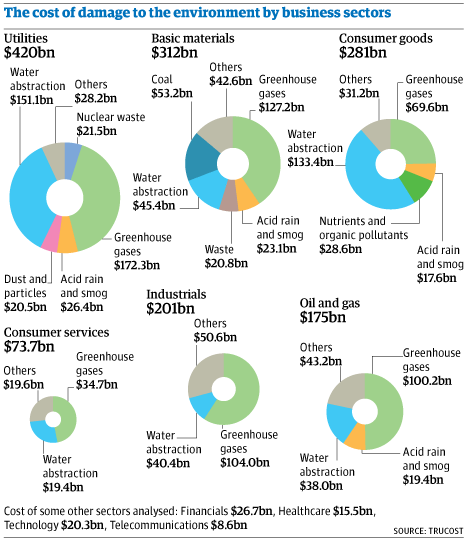

Since 1988, 71% of all the world’s carbon emissions have been produced by just 100 companies. Their operations are largely responsible for the climate crisis we now face.
A crisis that costs the world economy roughly $4.7 trillion in medical and social costs every year. Can you guess who’s paying for it?
[related_post]
Look in the mirror, Yes You, me everyone around you is. We can be naïve to think that companies already do pay to pollute. With the effects of climate change becoming increasingly more noticeable, more countries are implementing policies like the “polluter pays” principle. The Polluters Pay Principle basically says that companies have to pay to fix the environmental damages they cause.

In other words, you break it, you buy it. But this is not happening. The U.S. Environmental Protection Agency even admits that certain environmental standards aren’t fully implemented in U.S. law. So if companies are paying for their pollution, those payments are probably subsidized.
In fact, in 2015, the world’s biggest fossil fuel companies received a combined $5.3 trillion in subsidies, China alone provided subsidies of $2.3tn. Meanwhile, common man like us all over the world helped pay for more than 90% of the cost of recycling.
So why do you keep paying to fix the planet…when companies are getting paid to pollute? In 2008, the combined environmental impact of companies around the world was $2.2 trillion dollars in damages. One report goes on to say that India and China could save 10 Trillion dollars if temperatures stay within 1.5 degrees C which also mean such staggering losses are also following.
That’s a higher figure than every national economy in the world except the top three economies of the world-US, China and the EU(before Brexit). In 2017, the United Nations-backed a study investigating how much it would cost companies to pay for their pollution in full.
In short, they would lose one-third of their profits. But would that be a bad thing?
At first, maybe. The cost for most products you use on a daily basis would skyrocket since businesses would try to recoup their losses by raising prices. But in the spirit of competition, companies would probably try to seize market share by innovating, adopting greener strategies, and lowering their prices.
Some companies have already launched initiatives to reduce their carbon footprint. Giants like Apple, Facebook, Google and Ikea are among 156 companies that have committed to 100% renewable power.
Even oil and gas companies like Shell are turning to green energy, with Shell recently announcing that it was investing between $1 billion and $2 billion in the division each year until 2020 in its Energy Transition report. Of course, this comes after recent findings that fossil fuel companies risk wasting over 2 trillion dollars on dirty projects that might prove worthless.
Read : A big Milestone: 1000 companies Commit to divest from Fossil Fuels
With electric cars becoming more efficient, affordable, and eco-friendly (Read Tesla), it’ll be a more popular choice among consumers, while, big gas guzzlers will be left on the lot. As more companies embrace renewable solutions like wind or solar power, the price of these systems would decrease, making clean energy a reasonable choice not just for companies, but for families too.
With Solar Panels becoming cheaper with time your roof might actually earn you some money by selling power back to the grid! So while a lot of corporations continue to evade paying for their pollution, progress is being made.
Also Read: A Grid that is almost 100% Renewable Energy Powered? It’s Happening
From companies changing their business practices to whole countries, like France, switching to 100% recycled plastic by 2025. Reports about climate change are always scary, but remember, we can always choose to do something about it.
In a key step toward advancing clean energy adoption, Ahmedabad headquartered IRM Energy Ltd has…
Biofuels conglomerate Aemetis has announced that its subsidiary in India – Universal Biofuels – has…
The Greater Noida Industrial Development Authority (GNIDA) has commenced construction of a 300-tonne-per-day (TPD) bio-CNG…
The World Earth Day – with this year’s theme on ‘Our Power, Our Planet’ –…
In a significant step toward promoting decentralized waste management and clean energy, Tata Steel UISL…
Jaipur headquartered bioenergy player Rajputana Biodiesel Ltd has announced that its subsidiary, Nirvaanraj Energy Private…